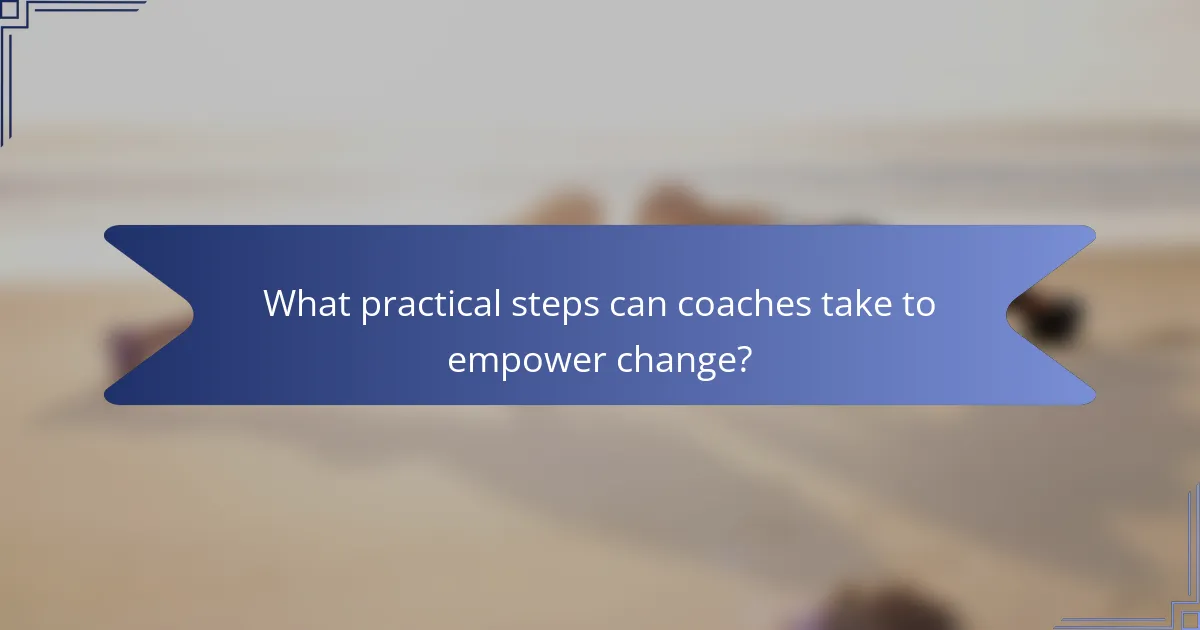Life coaching can significantly empower individuals to create meaningful change in their lives. Key psychological principles such as empowerment, self-awareness, and resilience form the foundation for effective coaching. This article explores how these principles enhance personal growth, the importance of empathy and active listening, and the integration of psychological theories to foster meaningful transformation. Additionally, it discusses structured strategies for coaches to build trust and promote a growth mindset in their clients.

What are the key psychological principles for life coaching?
Key psychological principles for life coaching include empowerment, self-awareness, and resilience. Empowerment fosters client agency and decision-making. Self-awareness enhances understanding of thoughts and behaviours, leading to personal growth. Resilience cultivates the ability to overcome challenges and adapt to change. These principles create a foundation for effective life coaching, enabling clients to achieve their goals and improve their overall well-being.
How does understanding human behaviour enhance coaching effectiveness?
Understanding human behaviour significantly enhances coaching effectiveness by enabling coaches to tailor their approaches to individual needs. This personalization fosters deeper connections, leading to increased trust and motivation. Coaches who grasp psychological principles can identify patterns in behaviour, which helps in setting realistic goals and developing strategies that resonate with clients. As a result, clients experience greater self-awareness and resilience, essential for sustained personal growth. Understanding these dynamics allows coaches to create a supportive environment, ultimately empowering clients to enact meaningful change in their lives.
What role does self-awareness play in personal development?
Self-awareness is crucial for personal development as it fosters understanding of emotions, strengths, and weaknesses. This insight allows individuals to set realistic goals, adapt behaviours, and enhance decision-making. As a result, self-awareness promotes resilience by enabling better responses to challenges. Cultivating this attribute can lead to significant improvements in personal and professional growth.
What techniques can improve self-awareness in clients?
To improve self-awareness in clients, utilize techniques such as reflective journaling, mindfulness practices, and feedback sessions. Reflective journaling encourages clients to explore thoughts and emotions, enhancing introspection. Mindfulness practices, like meditation, foster present-moment awareness, reducing distractions. Feedback sessions facilitate external perspectives, prompting clients to recognize blind spots. These techniques collectively empower clients to gain deeper insights into their behaviours and motivations, promoting personal growth.
How can resilience be cultivated through psychological strategies?
Resilience can be cultivated through psychological strategies such as cognitive restructuring, mindfulness, and goal-setting. Cognitive restructuring helps individuals challenge negative thoughts, promoting a positive mindset. Mindfulness practices enhance self-awareness, allowing for better emotional regulation. Goal-setting fosters a sense of purpose and achievement, reinforcing resilience over time.
What models support the development of resilience?
Cognitive-behavioural therapy, positive psychology, and the resilience framework support resilience development. These models emphasize self-awareness, adaptability, and coping strategies. Cognitive-behavioural therapy focuses on changing negative thought patterns, enhancing emotional regulation. Positive psychology promotes strengths and well-being, fostering a growth mindset. The resilience framework identifies protective factors and skills that enhance resilience, such as social support and problem-solving abilities.

What universal attributes define effective life coaching?
Effective life coaching is defined by empathy, active listening, goal-setting, accountability, and adaptability. These universal attributes foster a supportive environment for personal growth.
Empathy allows coaches to connect with clients’ emotions, enhancing trust. Active listening ensures clients feel heard, promoting deeper self-exploration. Goal-setting provides direction, while accountability keeps clients motivated. Adaptability enables coaches to adjust strategies based on individual needs, ensuring personalized support.
How do communication skills impact coaching outcomes?
Effective communication skills significantly enhance coaching outcomes by fostering trust, clarity, and engagement. Coaches who communicate well can better understand clients’ needs, leading to tailored strategies that promote self-awareness and resilience. Strong communication also encourages open dialogue, allowing clients to express challenges and goals, which is essential for empowering change. Research indicates that effective communication can improve client satisfaction by over 30%, highlighting its critical role in successful coaching relationships.
What are the essential qualities of a successful life coach?
A successful life coach embodies empathy, effective communication, and strong self-awareness. These qualities empower clients to achieve personal growth and resilience. Empathy allows coaches to connect with clients emotionally, fostering trust. Effective communication ensures clarity in conveying ideas and strategies. Strong self-awareness enables coaches to reflect on their own biases, enhancing their ability to guide clients. Additionally, adaptability is crucial, as it allows coaches to tailor their approach to individual client needs.

What unique psychological theories enhance life coaching practices?
Unique psychological theories such as positive psychology, cognitive-behavioural theory, and humanistic psychology enhance life coaching practices. Positive psychology focuses on strengths and well-being, fostering resilience and self-awareness. Cognitive-behavioural theory emphasizes the connection between thoughts and behaviours, enabling clients to identify and change negative patterns. Humanistic psychology promotes personal growth and self-actualisation, encouraging clients to explore their potential. Integrating these theories empowers coaches to facilitate meaningful change and deeper self-discovery in their clients.
How does Gestalt therapy contribute to personal development in coaching?
Gestalt therapy enhances personal development in coaching by fostering self-awareness and promoting holistic understanding. It emphasizes the importance of being present and recognizing one’s feelings, thoughts, and behaviours in the moment. This approach encourages clients to explore their experiences and gain insights into their patterns, leading to greater emotional resilience. By integrating Gestalt principles, coaches can facilitate deeper connections with clients, helping them to identify and address barriers to personal growth. This method aligns with the root attribute of empowerment, as it equips individuals with tools to navigate their challenges effectively.
What is the significance of cognitive-behavioural techniques in life coaching?
Cognitive-behavioural techniques are significant in life coaching as they enhance self-awareness and promote effective change. These techniques help clients identify negative thought patterns and replace them with constructive beliefs. This process builds resilience, empowering individuals to manage challenges more effectively. Research shows that integrating cognitive-behavioural strategies in coaching can lead to substantial improvements in personal development and goal achievement.

What rare attributes can distinguish a life coach in the UK?
A life coach in the UK can be distinguished by their unique ability to integrate psychological principles with practical strategies. Rare attributes include specialized training in cognitive-behavioural techniques, advanced emotional intelligence, and a focus on neuro-linguistic programming. These attributes empower clients to achieve profound self-awareness, foster resilience, and facilitate meaningful change. Coaches who possess these rare qualities can create tailored approaches that resonate deeply with individual client needs.
How does cultural competence influence coaching effectiveness?
Cultural competence significantly enhances coaching effectiveness by fostering trust and understanding. Coaches who recognize and respect diverse cultural backgrounds can tailor their approaches, making clients feel valued and understood. This alignment boosts client engagement and promotes open communication, essential for effective coaching. Research indicates that culturally competent coaches achieve higher client satisfaction and better outcomes, as they can address unique challenges faced by individuals from different backgrounds.
What innovative approaches are emerging in life coaching?
Emerging innovative approaches in life coaching leverage psychological principles to empower change and enhance self-awareness. Techniques such as mindfulness integration, strengths-based coaching, and neuro-linguistic programming (NLP) are gaining traction. These methods foster resilience by focusing on individual strengths and promoting adaptive coping strategies. Additionally, data-driven assessments, like psychometric tools, provide personalized insights, tailoring coaching experiences to unique client needs. Emphasizing emotional intelligence further supports clients in navigating challenges effectively.

What practical steps can coaches take to empower change?
Coaches can empower change by implementing structured strategies that enhance self-awareness and resilience. Start by establishing a trusting relationship to facilitate open communication. Utilize active listening to understand clients’ perspectives deeply. Encourage goal-setting using the SMART criteria to ensure clarity and focus. Incorporate mindfulness techniques to promote present-moment awareness, which can reduce anxiety and enhance decision-making. Regularly assess progress through feedback sessions, allowing clients to reflect on their growth and adjust their goals as needed. Finally, foster a growth mindset by celebrating achievements and viewing challenges as opportunities for development.
What are the best practices for setting achievable goals with clients?
To set achievable goals with clients, employ specific psychological principles. Focus on SMART criteria: Specific, Measurable, Achievable, Relevant, and Time-bound goals. Engage clients in the goal-setting process to enhance self-awareness and commitment. Encourage regular progress tracking to build resilience and adapt strategies as needed. Foster an environment of support and accountability to empower clients in their journey.
How can feedback loops improve coaching sessions?
Feedback loops enhance coaching sessions by promoting continuous improvement and deeper self-awareness. They allow clients to reflect on their progress and understand the impact of their actions. This iterative process fosters resilience, enabling clients to adapt and grow. Regular feedback cultivates an environment of trust, encouraging open communication and accountability. Ultimately, these loops empower clients to take ownership of their development, leading to more effective coaching outcomes.
What methods can be used to gather effective feedback?
Effective feedback can be gathered through structured methods like surveys, one-on-one interviews, and group discussions. These approaches encourage open communication and provide insights into personal growth. Surveys can quantify self-awareness changes, while interviews allow for deeper exploration of resilience strategies. Group discussions foster a supportive environment, enhancing collective learning. Each method aligns with psychological principles, promoting empowerment and constructive change.
What common mistakes should coaches avoid?
Coaches should avoid common mistakes such as lacking clear goals, failing to listen actively, and neglecting self-care. These errors can hinder client progress and damage the coaching relationship. Establishing specific objectives is crucial for guiding sessions effectively. Active listening fosters trust and understanding, essential for empowering clients. Prioritising self-care prevents burnout, allowing coaches to remain effective and resilient.
How can coaches optimize their approach for client success?
Coaches can optimize their approach for client success by applying psychological principles that enhance self-awareness and resilience. Utilizing techniques such as active listening, goal setting, and cognitive restructuring fosters a supportive environment.
Building rapport is crucial; it establishes trust and encourages open communication. Coaches should also employ motivational interviewing to align client goals with intrinsic motivations, promoting sustainable change.
Incorporating feedback mechanisms allows clients to reflect on their progress, reinforcing positive behaviours. Regularly revisiting goals ensures they remain relevant and achievable, adapting to the client’s evolving needs.
Lastly, integrating mindfulness practices can enhance emotional regulation, helping clients cope with challenges more effectively. This holistic approach empowers clients to take ownership of their journey, leading to lasting success.
What expert insights can enhance life coaching strategies?
Integrating psychological principles can significantly enhance life coaching strategies by fostering self-awareness and resilience. Techniques like cognitive-behavioural approaches help clients identify and reshape negative thought patterns. Mindfulness practices encourage present-moment awareness, promoting emotional regulation. Additionally, the application of motivational interviewing can empower clients to articulate their goals and values, leading to more meaningful change. Emphasizing strengths-based coaching further supports clients in building confidence and resilience, facilitating lasting transformation.